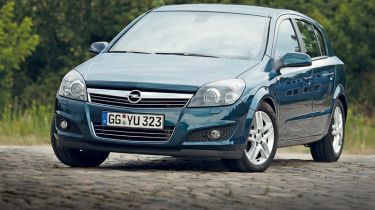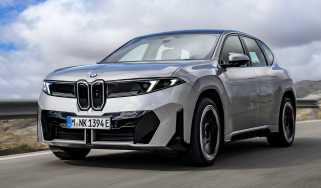Vauxhall Astra 1.7
Vauxhall's new 1.7 turbodiesel Astra betters its 1.9-litre brother in every way

More efficient, more economical and as good to drive as ever: Vauxhall's new 1.7 turbodiesel betters its 1.9-litre brother in every way. It's a clear sign that we have much to look forward to, with ever-smaller motors offering all the performance of their bigger brothers but with lower emissions and better economy. For now, the only fly in the ointment is the need for a tax break. Over to you, Gordon Brown!
Don't be deceived. This may look like an ordinary Astra but, as far as Vauxhall is concerned, it's the future of green motoring. That's because it is one of the first of a new wave of models sold under the company's ecoFLEX banner.
Showcasing the latest in environmentally friendly technology, in years to come ecoFLEX will, ultimately, include hybrids and even hydrogen fuel cells. For now, it is diesel and petrol engines that are in the spotlight - and downsizing is the name of the game.
Under the bonnet of this Opel-badged Astra lies a new 1.7-litre version of the familiar common-rail CDTI turbodiesel. It offers lower emissions and fuel consumption than the existing 1.9 unit, but no loss in performance. It's available as a 110bhp version or the 125bhp model tested here. Visually, the only difference between the new cars and the existing diesels are the red-painted final two letters of the CDTI badge.
Under the bonnet, engineers have introduced the very latest exhaust gas recirculation technology to keep emissions as low as possible. Bypass flaps, controlled by the engine-management system, make sure that the exhaust gases reach the optimum temperature as they re-enter the combustion chambers. As well as this, the motors get a diesel particulate filter.
The results are pretty impressive. The 110bhp version emits 140g/km of CO2 and returns 54mpg, while the 125bhp unit produces 146g/km and achieves 52.3mpg. By comparison, the 120bhp 1.9-litre CDTI kicks out 157g/km and economy of 48mpg. However, it's worth pointing out that Ford's Focus 1.8 TDCi emits 137g/km and also returns 54mpg.
Still, the latest Astra engines will mean some useful fuel savings and, for company car drivers, a lower tax burden as well. For example, the new 1.7-litre model would sit in a 19 per cent benefit-in-kind (BIK) band - that's three per cent lower than the 1.9. And because it's already compliant with forthcoming Euro V emissions requirements - thanks also to that particulate filter - there's the potential for further savings.
At the moment, all new diesel cars carry a three per cent BIK surcharge, but there's a chance that the Government will remove this - as it did with Euro IV models - to incentivise the take-up of ever-cleaner engines. Vauxhall's problem is that this is still only a mooted plan, which is why the new 1.7-litre engines are not scheduled to come to the UK just yet. A spokesman explained to us why. "Obviously, we'll have to bring in Euro V-compliant models ahead of the 2009 deadline. For now, though, it's not cost-effective for us," he said. "A diesel particulate filter adds £500 to an Astra's price and there are no BIK incentives for Euro V models. If Prime Minister Gordon Brown takes away the surcharge for Euro V cars, as we believe he will do soon, then we will bring the new 1.7-litre vehicles into the UK instantly."
Hopefully, then, the latest 1.7 mod-els should arrive in 2008, and when they do they'll clearly be the pick of the Astra range. Driving our 125bhp car, we found performance to be equally as good as the 1.9's, with a healthy 280Nm of torque helping to propel the Astra from 0-60mph in just over 10 seconds and on to a top speed of 121mph. A six-speed transmission is standard and, teamed with the gutsy engine, there's plenty of overtaking urge. As well as the 1.7-litre diesel, future Vauxhalls will make use of small turbocharged petrol units, too, including a 1.6-litre turbo for the next Vectra in place of a normally aspirated 2.2 unit.
Judging by this drive, the future looks bright - even if Vauxhall is hiding its light under a bushel!



